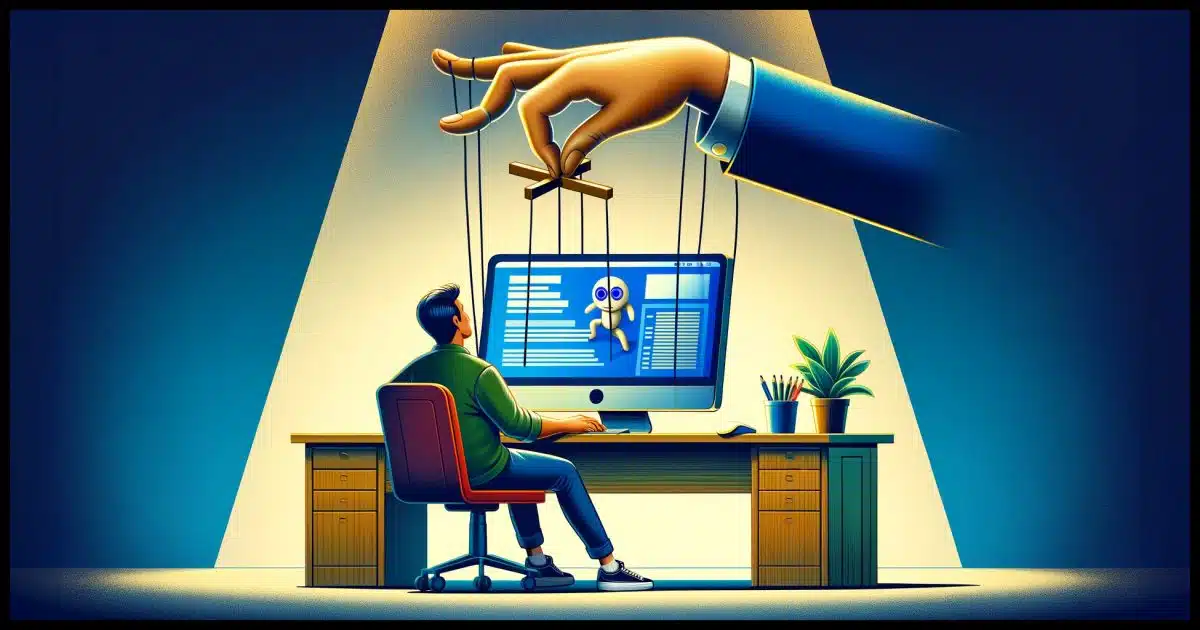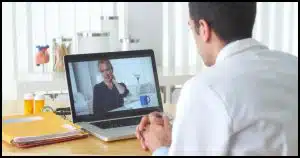That and so much more.

While this seems like a very specific scenario and concern, I want to address it because it’s a fine example of what a lot of people don’t seem to realize — something very important about the nature of hacking, malware, compromised machines, and the importance of security overall.
To directly answer your question, yes, absolutely. If your machine has been hacked into or is compromised with malware in some way, a hacker could certainly record your video calls.
But the situation is much worse than that.

Can malware record me?
If your computer is compromised by malware or hacking, hackers can indeed record your video calls, as well as audio, keystrokes, data, and more. Once your machine is compromised, it’s essentially not yours anymore, and hackers can do just about anything with it without your notice. The bottom line: maintain proper security practices.
It’s not your computer anymore
There’s an old adage that I think people need to hear more often:
Once there’s malware on your machine, it’s not your machine anymore.
Or if you prefer different terminology: once your machine has been hacked, it’s not your machine anymore.
Once your machine has been compromised in any way, a hacker can do anything. And by anything, I do mean anything!
They can record your video, your audio, your keystrokes, your mouse movements, your screen; anything you do. They can copy your data, history, programs, files, emails, pictures; anything on your machine.
They can use your computer to send spam, hack other computers, spread malware, hide their location, or anything else. And if they’re any good, they can do most of what I described without you noticing.
Help keep it going by becoming a Patron.
This is why I harp on staying safe
As soon as you say, “If I’m sure that a hacker is controlling my computer”, without going any further I can tell you you’re screwed. It’s not your computer anymore. The hacker can do anything they want with it.
That’s why people like me harp so hard on staying safe in the first place. That’s why we want you to keep your system up to date, run anti-malware scans, and learn what it means to stay safe.
Avoid downloading and installing stuff you don’t need. Don’t trust everything that’s emailed to you. Don’t open attachments that you aren’t 100% certain are safe. Whatever it is, if you’re not sure, just don’t. This is all stuff you already know or should already know. The key is remembering it and making it a habit.
I know that it sounds overwhelming, but it’s completely doable and doesn’t have to be a huge imposition. Just like there are rules to driving a car safely, once you get them memorized, they become second nature as soon as you pull out of the driveway. Working to use the internet safely can become just as second nature, and then you won’t have to worry about whether or not your video chat is being recorded.
A word about “My computer’s been hacked”
I would say that over 80% of the questions I get from people who are certain their computer has been hacked …
It hasn’t been. Not even close. Often there’s not any malicious software present.
When some folks, when they see something happening they don’t understand, “I’ve been hacked!” is their go-to response. They’re almost always wrong. Sometimes it’s just software behaving as it should, but they’re just not familiar with it. Sometimes it’s software whose behavior has changed unexpectedly. Sometimes it’s software misbehaving for some benign reason. Sometimes it’s a hardware issue.
Yes, sometimes it’s malware — sometimes it’s even a hack — but in the vast majority of situations, it’s not.
Thinking you’ve been hacked when you haven’t generally leads to unwarranted fear followed by bad decisions.
But is it possible to record video?
In response to repeated comments when this article was originally published, let me be extra clear about a few things:
- Yes, it is possible.
- No, there’s no way to know.
- No, there’s nothing you can do about it after the fact.
- Yes, it’s technically possible that a video call from years ago could have been recorded and used to blackmail you today.
- But it’s all extremely unlikely.
Do this
The takeaway is simple.
- Maintain good security. Always.
- Don’t jump to the conclusion you’ve been hacked without extremely solid evidence.
While I have you, you might like to subscribe to Confident Computing! Less frustration and more confidence, solutions, answers, and tips in your inbox every week.





SSL (HTTPS:) connections and VPNs encrypt your communications. SSL encrypts all data end-to-end between your computer and a website. A VPN encrypts between your computer and the VPN server.
Unfortunately, those offer no protection against malware on your computer.
The malware sees and sends the data to the hackers before it is encrypted.